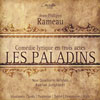Rameau (Les) Paladins
No longer the young radical, Rameau still satisfies in this late parody
View record and artist detailsRecord and Artist Details
Composer or Director: Jean-Philippe Rameau
Genre:
Opera
Label: Coviello
Magazine Review Date: 2/2011
Media Format: CD or Download
Media Runtime: 0
Mastering:
Stereo
Catalogue Number: COV21013

Tracks:
| Composition | Artist Credit |
|---|---|
| (Les) Paladins |
Jean-Philippe Rameau, Composer
Anders J. Dahlin, Atis, Tenor Anna Virovlansky, Argie, Mezzo soprano Jean-Philippe Rameau, Composer Julia Surdu, Nérine, Soprano Konrad Junghänel, Conductor New Düsseldorf Hofmusik |
Author: Richard Lawrence
Les paladins, a comédie-lyrique in three acts, was based on a fairy-tale by La Fontaine called “The dog that shook off money and gems”, which in turn was derived from Orlando furioso, the epic poem by Ariosto. The plot anticipates elements of both Il barbiere di Siviglia and Die Entführung. Atis, a paladin – a knight errant – has been separated from Argie, who, with her maid Nérine, is confined by her guardian Anselme. Their gaoler is Orcan, Anselme’s servant, who lusts after Nérine. Atis and his fellow paladins arrive to rescue Argie from Anselme, who wishes to marry her. They are assisted by Manto, a fairy of uncertain sex, and the lovers are reunited.
What the original spectators must have recognised, even if they didn’t like it, was the element of parody and indeed self-parody in the score. This is lost on most audiences today, who rarely have the chance of seeing a Rameau opera on stage (come on, Glyndebourne!). For instance, Argie’s “Triste séjour”, with its mournful bassoons, turns out to be a parody of “Tristes apprêts” in Castor et Pollux; while Manto’s “De ta gravité” could be straight out of Platée. More easily recognisable, perhaps, is the Italianate coloratura of Atis’s airs, heroically sung by Anders Dahlin.
This “live” recording from Duisburg is satisfying in its way: the excellence of the period orchestra, especially, enables one to appreciate the delights of Rameau’s instrumentation. To enjoy it as a drama, though, you need the brilliantly inventive production on DVD by Les Arts Florissants (Opus Arte, 4/06).
Discover the world's largest classical music catalogue with Presto Music.

Gramophone Digital Club
- Digital Edition
- Digital Archive
- Reviews Database
- Full website access
From £8.75 / month
Subscribe
Gramophone Full Club
- Print Edition
- Digital Edition
- Digital Archive
- Reviews Database
- Full website access
From £11.00 / month
Subscribe
If you are a library, university or other organisation that would be interested in an institutional subscription to Gramophone please click here for further information.




